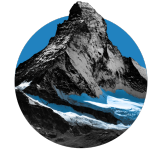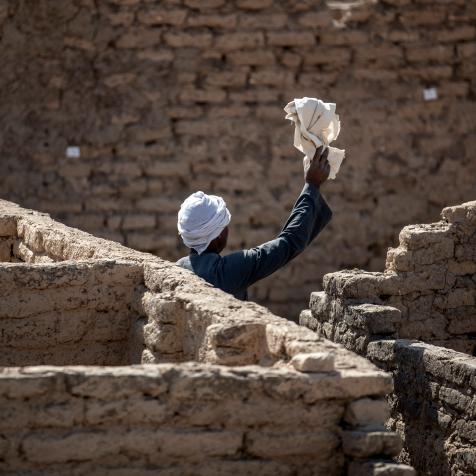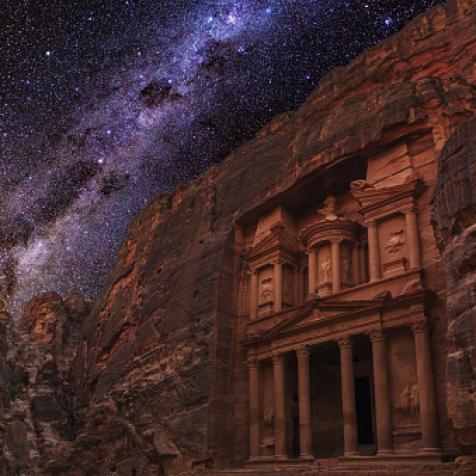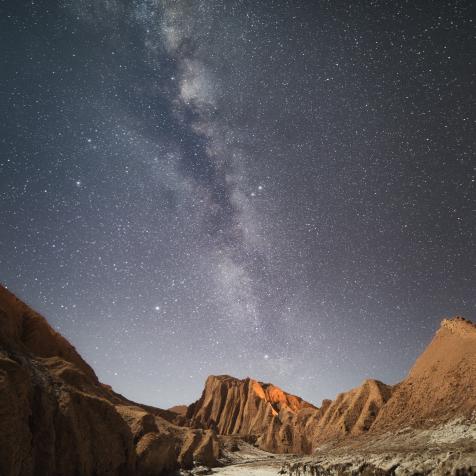
Get to Know The Explorers Club's Black History Month Panelists
To celebrate Black History Month, The Explorers Club is hosting a panel of speakers to share amazing stories of little-known exploits in Black history, adventure, exploration, escape, resilience, and survival.
The panel streams live on Monday, February 28th at 7:00pm ET on explorers.org, their YouTube Channel, Facebook Live.
Ahead of the event, Discovery got a chance to ask these expert panelists, who range from doctors to anthropologists to business executives, a few questions about their experience.
What first drew you to the field of research and exploration?
J.R. Harris: Although I was a Black kid growing up on the streets of New York City, I was fascinated by the explorations and adventures of Lewis and Clark, the French-Canadian voyageurs, the Plains Indians, the pioneers in covered wagons, and my favorite – the mountain men. Like them, I wanted to journey into the wilderness in search of knowledge and adventure. There were no Black explorers I could look up to or emulate – Matthew Henson was never mentioned in school – but I was determined to make it happen anyway.
Bettye Kearse: I grew up hearing I descend from President James Madison and an enslaved cook. I wanted to learn more about her.
Jasmine Burr: I read Howard Carter: Searching for King Tut by Barbara Ford when I was 7 years old. I remember like it was yesterday, every day after school, while everyone was gawking over the latest release in the Harry Potter series, I gravitated towards Howard Carter: Searching for King Tut. From being mystified by the lives of people from the past, I decided that I wanted to become an archaeologist.

Jasmine Burr participated in her first Explorers Club Flag Expedition, an archaeological metal detecting survey in search of traces of enslaved workers. She is currently researching the history of Africatown, Alabama, and the genealogy of two of its co-founders — survivors of the infamous 1860 last slave ship Clotilda. She is planning a career in archaeology, focused on the history of the enslaved in America.
Lew Toulmin: I read Kon-Tiki by Thor Heyerdahl when I was 14, was entranced, and noted that he said that he planned his astounding expedition "on a huge globe in The Explorers Club." I swore then and there that someday I would become an explorer, like Thor, and join that Club! Thirty-nine years later I made it!
Rebecca Davis: I did not become interested in archaeology until the end of my BA degree. Up until the last month of that degree, I was a historian and more than happy to be! During my last term, my college offered me the chance to take a class and visit all of the historic sites that you studied in real-time, basically a study abroad. It was here that I had the chance to travel through Egypt and Greece for a little over a month with my teacher who happened to be a classical archaeologist. Needless to say, by the end of it, I was hooked...
What has been the most interesting discovery you've made in your research?
Harris: As an ethnographer and social scientist, I have been exploring in remote regions around the world, unsupported and mostly alone, for more than 60 years, and I’ve been fortunate to meet people from incredibly diverse cultures, traditions, religions, and lifestyles. From all these voyages over all these years, the most impactful thing I have learned is that people are far more similar than they are different. Ultimately, everyone wants to live in peace, to enjoy being with family and friends, to raise healthy kids, to fulfill their life’s expectations, and to live in harmony with nature. In a world seemingly engulfed in chaos, it is comforting to believe that this commonality may be the key to unlocking a more hopeful and productive future.
Kearse: In 1992, I made the first of my many visits to Montpelier and was shown the excavation site of the south kitchen, where my ancestor once worked. I was able to walk literally in the footsteps of an ancestor.

Dr. Bettye Kearse, a retired pediatrician, has developed close ties to President James Madison’s Montpelier plantation in Virginia and its staff, as she did research for her multiple award-winning book, The Other Madisons: The Lost History of A President’s Black Family.
Burr: Surrounded by the Blue Ridge mountains and a multitude of civil war battlefield sites, you guessed it, my first and only expedition at the Montpelier plantation in Orange, Virginia. The excavation took place at an unknown site at the plantation. With my metal detector in hand, it was my first hit – I found several nails that were about 200 years old!
Toulmin: In 2014 I was living in the Republic of Vanuatu, in the Southwest Pacific, and working in the Prime Minister's Office. One of my colleagues casually mentioned that her half-sister was a chief on one of the outer islands of the large archipelago. I said, "That's impossible! Anthropologists for more than 100 years have been saying that there are NO female chiefs in Vanuatu!" So together we launched an Explorers Club Flag Expedition, and we found, interviewed, and documented black female chiefs where Western anthropologists had always claimed there were none.
Davis: The most interesting discovery that I helped to make was with a team of people doing a geophysical survey in Maryport, England. Maryport is situated on the western end of Hadrian's Wall, and we ended up finding a Roman road, which then led to the discovery of a couple of Roman altars. This might not be the "sexiest" archaeological find, but it was my first experience finding anything, and more importantly, it was the first time I felt like an archaeologist.

Rebecca Davis holds a BA in history and two master’s degrees, one in historical archaeology from Newcastle University in England and one in archaeology/anthropology from the University of Bristol. She is currently working on her Ph.D. in archaeology at the University of California at Santa Cruz. She has expertise in landscape and plantation archaeology and history in the US, England, Haiti, and the Virgin Islands.
What advice would you give to the next generation of explorers?
Harris: Stay curious. Curiosity is the engine that drives exploration and discovery. There are so many unknowns in the natural world, but all the answers are there for those who are curious enough to go out and find them. The future of the planet depends upon the curiosity of our next generation of explorers and scientists.
Burr: This may sound cliché, but never give up. If one door closes, search for another. There are more opportunities out there, more so than a decade ago. There are also more opportunities for women of color to explore the world of archaeology.
Toulmin: My advice is: Save the planet! I am an expert in emergency management, and I can tell you that we are in a climate crisis. We need climate crisis scientists/explorers and emergency managers and mitigators who can get us out of this mess.
Davis: There would be two things that I would want to say to the next generation. First, figure out what your purpose or passion is (simple, right?!) and recognize that the path to achieving your purpose might not be an easy "A to B" situation. Second, be willing to get knocked down. But please use whatever resources, tools, family/friend network, etc. you have to get back up and carry on!

John Feldcamp
J. Robert Harris is a resident of New York City and has been exploring, unsupported and mostly alone, in remote areas around the world for more than 50 years. When not in the wilderness, J.R. is founder and president of JRH Marketing Services. Established in 1975, it is the oldest and most experienced African American-owned consulting and research firm in the United States.
How can we continue to amplify the voices of Black American history and exploration?
Harris: We need to emphasize that the story of Blacks in American history is one of hope, perseverance, and of overcoming the tremendous obstacles that took us from slavery to achieving the nation’s highest office. We should also find and tell the untold stories of Black heroes so that a kid like I was will have someone to emulate and look up to. The African American dream is, in reality, a version of the American dream, and in our increasingly diverse and multicultural society, it is an uplifting story of promise for all of us. While it is wonderful that we have a designated Black History Month, our learning and listening cannot be limited to these few weeks—after all, Black Americans are Black every day of the year. Black history is integral to American history.
Burr: Honestly, we need more black people interested in exploration. Yes, we can continue to celebrate the achievements and bring awareness of what black people contributed, but until we have more black people wanting to become explorers, it will be difficult to have progress in acknowledging the achievements that black people have contributed.
Toulmin: We must have a national conversation about the history of Africa and the United States, and about the unrecognized contributions of Black Americans to science, exploration, engineering, culture, art, law, and all other fields of human endeavor. This conversation needs to begin in the schools, but be amplified through the media, using all channels of communication.

Lew Toulmin has traveled to 147 of the 196 countries on Earth and worked in 30 developing countries (including 17 in Africa) for the World Bank and USAID. He has written on explorer Matthew Henson, Reverend Josiah Henson, and Matilda McCrear, the last living survivor of the infamous slave ship Clotilda. He is currently leading an effort to document the history and descendants of the Clotilda and Africatown, Alabama, in cooperation with the Clotilda Descendants Association.
Davis: This is a great question that sadly does not have an easy response. To mirror Jasmine's answer a little, amplifying voices of African American history and exploration is wonderful, but it's not enough. We need to recognize the gatekeeping barriers in place that prevent more diverse voices from being in the room, be it membership fees, tuition, inherent bias, or lack of outreach to targeted audiences. When there are conscious efforts to dismantle some of these obstacles, there will be more diversity in those involved, diversity for those writing these histories, and more opportunities for African Americans to amplify and explore their own purposes.
All responses have been edited for length and clarity.

















